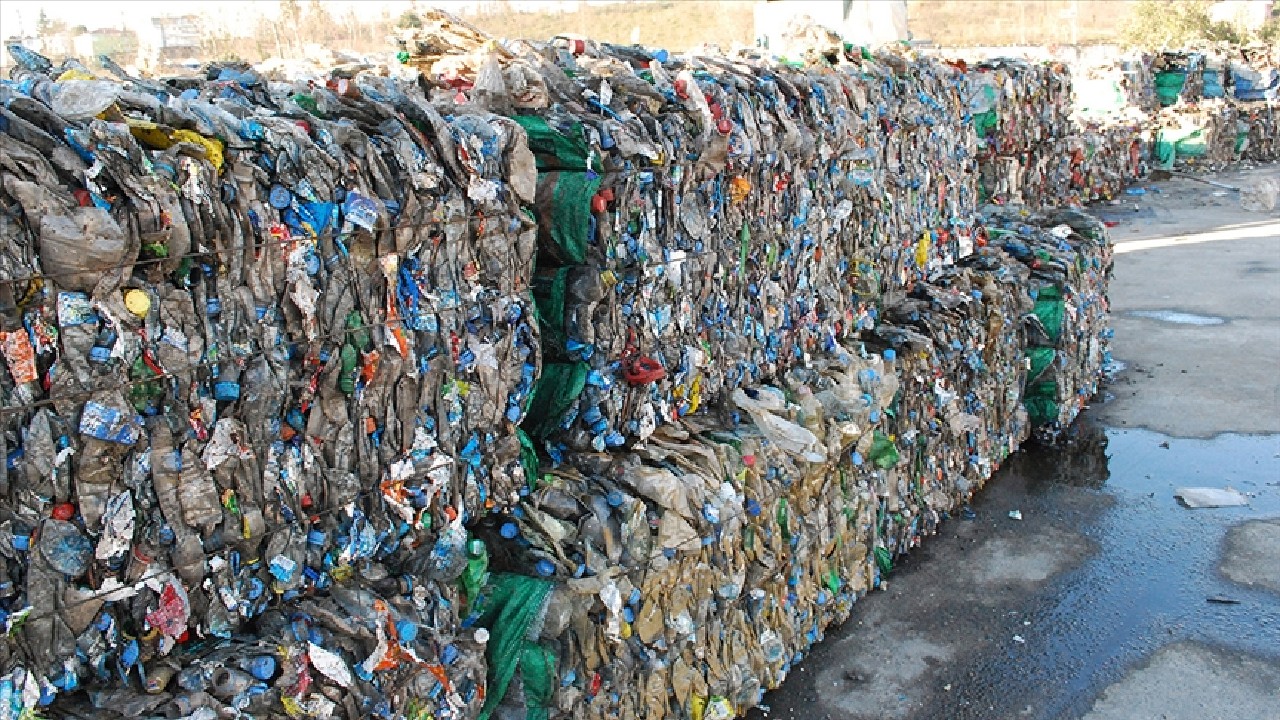“Ali,” a man in his mid-20’s, started working in plastic recycling in Adana, a city in the south of Turkey, when he was 13 years old. He worked 13 hours per day in a recycling facility sorting, shredding, and melting plastic into small pellets. Five years ago, Ali quit his job because he had trouble breathing that he thought was linked to air pollution in the recycling facility. “There’s a strong smell of gas,” he explained.
Ali’s story is not unique. While often touted as a positive, environmentally friendly practice, plastic recycling can pose significant threats to human rights and the environment. Plastic products contain toxic chemical additives that can cause serious health problems. Plastic recycling releases those toxins into the local environment, threatening the health of those working in the industry and living nearby recycling facilities.
This report documents the health impacts of plastic recycling on facility workers and residents living near facilities in Adana and Istanbul, Turkey, a major destination for the European Union’s plastic waste. For decades, many countries in the Global North exported their plastic waste to China for recycling. But in 2018, the Chinese government banned plastic waste imports, leaving exporting countries scrambling to find new destinations for their waste. Turkey’s geographic proximity to and strong trade relations with the European Union (EU), and its status as an OECD member have made it a key destination for EU plastic waste exports since the Chinese government ban. In 2020, Turkey was the single largest recipient of EU plastic, importing nearly 450,000 tonnes. The recent influx of EU plastic waste imports contributed to the growth of the plastic recycling sector in Turkey.
Human Rights Watch research found that plastic recycling facility workers and nearby residents can be exposed to harmful chemicals when they inhale toxic dust or fumes emitted during the recycling process, which threatens their right to health. This exposure to air pollution puts workers and residents at the risk of developing significant life-long health conditions, including cancer and reproductive system harms.
The plastics industry has championed recycling as a way to manage waste from their products, while making few efforts to minimize the amount of plastic in their products or design products that can easily be recycled. Many plastic products are designed to be used once, difficult to recycle, and remain in the environment for decades or centuries.
Plastic production, use, and disposal generates harmful effects for human health and the environment. Governments’ human rights obligations require them to address these harms and to protect the rights to health and to a healthy environment. Plastics are produced from oil and gas and then mixed with chemical additives. Plastic production transforms fossil fuels and chemical additives into plastic and, in the process, releases toxic chemicals that are harmful to human health. Plastic recycling and disposal, including dumping, landfilling, and burning, are also linked to negative health and environmental impacts and can emit greenhouse gases. Historically, it is estimated that only nine percent of all plastic ever produced has been recycled, while most plastic waste accumulates in landfills, dumps, the natural environment, or is burned, releasing harmful toxins and greenhouse gases.
Throughout their lifecycle, plastics contribute to climate change. Ninety-nine percent of plastics are made from fossil fuels, including oil and gas. In 2019, global production, disposal, and incineration of plastic emitted 850 million metric tons of greenhouse gases (CO2e), which is the equivalent to the emissions of nearly 190 medium-sized coal power plants. If plastic use continues its current growth trajectory, by 2050 the GHG emissions from its production and incineration will reach 15 percent of the global carbon budget, effectively making global climate goals very difficult, if not outright impossible, to reach.
For the small percentage of plastic waste that makes it to a recycling facility, recycling can pose significant threats to the rights of workers and nearby communities. In order to be recycled, used plastic is sorted, shredded into small pieces, melted, then reformed into pellets that can be used to make new plastic products. This process can have serious consequences for the health of workers and people living near facilities.
Scientific studies have found that localized air pollution and the release of toxins during plastic shredding and melting pose risks to human health. These include exposure to fine particles, dioxins, volatile organic compounds, and other harmful chemical additives in plastics, and have been linked to asthma, respiratory illnesses, cancer, and reproductive system harms.
Adana, a city of two million, is located near the Mediterranean port of Mersin, the destination for nearly 50 percent of Turkey’s plastic waste imports. For decades, Adana’s official industrial area, as well as the nearby neighborhoods of Şakirpaşa, Ova, Onur, and Uçak in Seyhan district, have been the center of plastic recycling in the country. As of April 2022, official figures show there were 167 licensed plastic recycling facilities in Adana and 232 licensed plastic recycling facilities in Istanbul, many of which are located near residences, medical clinics, schools, and parks.
Human Rights Watch interviewed more than two dozen plastic recycling facility workers from December 2021 to March 2022. These workers often come from some of the most marginalized populations in Turkey, including child workers, refugees, and undocumented migrants.
In Turkey, some of the plastic recycling facility workers and residents told Human Rights Watch that they experienced respiratory problems, severe headaches, skin ailments, worked without protective equipment, and had little to no access to medical treatment for occupational illnesses. Human Rights Watch found that licensed facilities in Adana and Istanbul are often located dangerously close to homes in contravention of Turkish law, which requires recycling facilities to be a “healthy” setback from settlements, which include residences, schools, and hospitals, so facilities do not cause any harms to the health or quality of life to those residing nearby. The close proximity of facilities to homes is threatening the health of nearby residents. In addition to health problems, local residents say intense odors and pollution from plastic recycling prevent them from sleeping, opening their windows, and spending time outside.
Children as young as 9 years old work in plastic recycling facilities in Turkey, despite legal protections prohibiting them from working in such hazardous conditions. Under international and Turkish law, work that is likely to harm the health of children is considered hazardous child labor and prohibited. Of the 26 workers interviewed by Human Rights Watch, nine began working in recycling facilities as children, including five who were children at the time of the interview. Workers in plastic recycling across Turkey told Human Rights Watch they earn wages significantly below Turkey’s minimum wage and work on average 12-hours per day, six-days per week. Fear over losing their jobs made workers wary about raising concerns with their employers over harmful working conditions, including working without access to personal protective equipment. Some facilities do not register their employees in the social security system, which provides access to public healthcare, as required by Turkish law, and some recycling facility workers said they do not have access to any medical services if they get sick or injured in the workplace.
Residents, current and former recycling facility workers, medical providers, and facility owners said they did not have information about risks from toxic exposure from recycling facilities or how to mitigate those risks. Despite legal obligations for official government sources and employers to share information on the impacts of air pollution and toxic exposure, workers and residents reported being in the dark about the impacts of plastic recycling on their health and how they could protect themselves. Human Rights Watch co-submitted 22 information requests with the nongovernmental organization Citizens Assembly to relevant ministries and municipalities, seeking information and data on the specific environmental and health impacts of the plastic recycling facilities in Turkey. Only two responses were received within the legal mandated timeframe.
Inadequate enforcement of laws is making the situation worse. In Adana and the Bayrampaşa district in Istanbul, interviewees told Human Rights Watch that they were aware of some plastic recycling facilities operate without licenses from the relevant authorities, although Human Rights Watch did not have the capacity to follow up and identify the facilities operating without a license. A license, if enforced, would require them to uphold higher environmental standards. Plastic recycling facility workers told Human Rights Watch that environmental, occupational health, and labor inspections often do not occur on a regular basis or inspectors do not adequately inspect environmental and health conditions.
The Turkish government’s ineffective response to the health and environmental impacts of plastic recycling and its lack of adequate air quality monitoring violates Turkey’s obligations under domestic and international law, including the government’s duties to respect and protect the rights to health and a healthy environment.
As the impacts of climate change and environmental pollution worsen, there is an increased need for a more circular economy, where products are reused, repaired, and refurbished instead of discarded, in order to reduce the consumption of raw materials and energy required to produce new goods. Viewing recycling as the main solution to plastics use is a false solution. Rather, reducing the production of new materials, like plastic, is essential in the circular economy. Without reducing the amount of plastic being produced, the production of plastics from fossil fuels will continue to exacerbate the climate crisis, a global threat to human rights. If plastic use continues to grow as projected, by 2050 the greenhouse gas emissions from plastic production and incineration will reach 15 percent of the global carbon budget.
To address the human rights harms associated with the business of plastic recycling in Turkey, the Turkish government should ensure that any unlicensed plastic facilities are identified, and required to cease operations and promptly apply for licenses, in line with the Regulation on Environmental Permits and Licenses. The Ministry of Environment, Urbanization and Climate Change should carry out effective and regular unannounced inspections of facilities to ensure compliance with environmental regulations, close or relocate facilities located near homes and schools in contravention of laws, and make information about the risks from air pollution readily available and accessible. The Ministry of Health should carry out health impact studies in neighborhoods near plastic recycling facilities and make community health data accessible and available. The Ministry of Labor and Social Security should carry out regular and thorough occupational health examinations for workers in recycling facilities, ensure that employers are providing adequate protective equipment, and ensure effective enforcement of the ban on child labor.
To protect the right to health for recycling facility workers and nearby residents, the Turkish government should implement existing laws and regulations to prevent human rights harms from the plastic recycling industry. Exporting countries, including those in the EU, should take steps to manage their waste domestically, rather than shipping their waste to other countries. And because the growing rates of plastic production and consumption will continue to contribute to human rights harms, countries should reduce production and consumption of plastic products in order to prevent future human rights impacts associated with plastic recycling and disposal.
Exporters of plastic waste to Turkey, including EU member states, should take steps to ensure that their plastic waste exports are not contributing to human rights harms in Turkey and other importing countries. The European Parliament and the European Council should ensure that the revised Waste Shipment Regulation, which is currently under consideration, puts an end to plastic waste exports to non-European Union or European Free Trade Association countries and extends protections to all countries, regardless of OECD status.
As most plastics are made of fossil fuels, do not biodegrade, and can take centuries to breakdown, it is imperative that the Turkish government take the urgent steps outlined in this report’s recommendations. Plastic created today will continue to be a problem for future generations, making the plastic crisis a significant multigenerational harm.
Source: HRW



